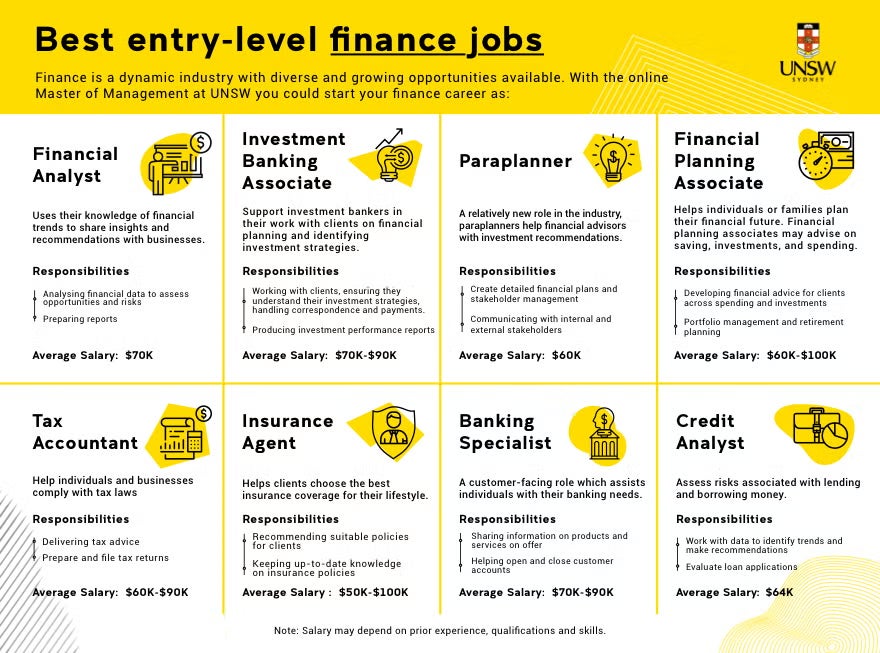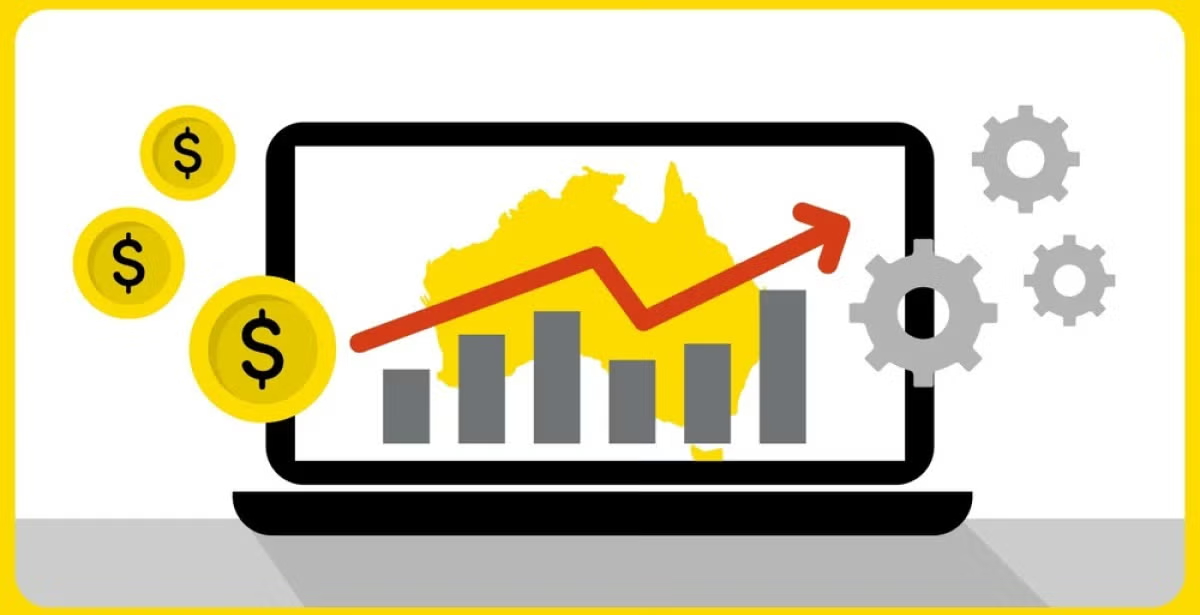Finance is one of the world’s most rapidly growing industries. In Australia, it's also one of the most secure career paths you can choose.
There's exciting news for entry-level candidates looking to break into the Australian finance sector. According to recent research, you'll only need a few years of experience to land 2022’s best entry-level finance jobs.
If you're starting your finance career path now, there's no need to worry – you'll be well on your way to a bright future in no time.
So, what are the best finance jobs in Australia right now? We've picked positions that offer excellent security, stability and advancement opportunities. Read on to find out more.
Projected trends and opportunities in the Australian finance sector
The Australian finance industry is currently experiencing rapid change, with a particular focus on digital transformation and innovation. There are so many opportunities for growth in the industry, especially in light of the pressures brought about by COVID-19.
Financial service leaders must focus on reinvigorating Australia's economic growth and keeping pace with rapidly evolving market expectations and demand. Key areas critical for success in this endeavour include:
- digital transformation
- workforce transformation
- business model innovation
- collaborative operating platforms.
8 entry-level finance jobs to launch your career in 2022
Finance is a great option if you're looking for a career with stability and a bright future. Despite some recent market turbulence, it's still one of the most stable and in-demand professions out there.
The best thing about a finance career is there are so many paths to take. You can work in corporate finance, investment banking, financial planning, or even become a financial analyst.
No matter what your interests are, there's an entry-level finance job out there that's perfect for you.
Here are eight of 2022's best jobs in Australia for entry-level finance graduates.
1. Financial Analyst
A financial analyst delivers insights and recommendations to businesses and individuals. They use their knowledge of financial markets and trends to assess opportunities and risks.
A day in the life of a financial analyst
The chief responsibilities of a financial analyst include analysing financial data, preparing reports and making recommendations to businesses and individuals. They use their knowledge of financial markets and trends to assess opportunities and risks. Financial analysts typically have a degree in finance or economics.
Salary expectations
A financial analyst's salary depends on several factors, including experience, the size of the company you work for and your skills and specialisations. The average salary for a financial analyst in Australia is around $70,000.
With experience, financial analysts can move up the ranks to become senior financial analysts, finance managers or even chief financial officers (CFO).
Why choose financial analytics?
The variety of opportunities open to a financial analyst makes it a good choice for an entry-level job. Financial analysts work across a range of industries, including banking, insurance, accounting and investment. You may also specialise in a particular area, such as corporate finance, risk management or investment banking.
2. Investment Banking Associate
Investment banking associates support investment bankers. You'll work with clients to identify and assess potential investments, advise on financial planning and investment strategies, and help to negotiate and execute deals.
A day in the life of an investment banking associate
This job is demanding, but it can also be extremely rewarding. You'll support your clients and make sure they're satisfied by identifying their needs and helping them reach their financial goals. It's your job to ensure they understand their investments and build positive client relationships. You'll also need to perform clerical tasks, such as processing documents and payments, producing reports and handling correspondence.
Salary expectations
Entry-level investment banking associates in Australia can earn around $70,000-$90,000 (depending on experience and qualifications). Those who can demonstrate strong finance skills and industry knowledge may negotiate a higher salary.
Why choose to be an investment banking associate?
An investment banking associate is a good entry-level job because it provides well-rounded finance industry experience. After a few years, many associates take the next step and become investment bankers.
3. Paraplanner
Paraplanning is a relatively new job in the finance sector that's becoming more popular. In a nutshell, paraplanners help financial advisors with planning and investment recommendations.
A day in the life of a paraplanner
Paraplanners create detailed financial plans for their clients. They must understand complex financial information and communicate it well so that clients understand it easily. This job requires excellent analytical and research skills, strong communication and great interpersonal skills.
Salary expectations
The average salary for an entry-level paraplanner in Australia is around $60,000. However, this can vary depending on your experience and qualifications. Paraplanning is a growing field, so there are plenty of opportunities for advancement.
With experience, you could move up to a senior paraplanner role, which typically pays around $85,000. If you have a master's degree in finance or a related field, you could earn even more.
Why choose paraplanning?
Paraplanning is an excellent entry-level job because it offers opportunities for advancement and it's a growing field. If you have a master's degree in finance or a related field, you could climb the corporate ladder faster than your cohort. Paraplanning is also a good career path if you're interested in becoming a financial advisor.
4. Financial Planning Associate
A financial planner helps individuals and families plan for their financial future. They advise on saving, investing and spending. As an associate, you'll support senior financial planners with analysis, data projections, client preparation and initial client briefings.
A day in the life of a financial planning associate
As a financial planning associate, you'll advise clients on investments, spending and other financial options to help them plan their financial future.
You may deal with investment portfolio management, retirement planning and office administration tasks. You'll also need to stay up to date on the latest trends in finance to provide your clients with the best possible advice.
Salary expectations
Entry-level financial planning associates can earn an annual salary of around $60,000. However, with experience and further qualifications, this can rise to over $100,000. With the right skills and qualifications, you'll find this is a fulfilling and lucrative finance career.
Why choose financial planning?
If you're looking for a career in finance, then a financial planning associate may be a perfect choice. This role offers opportunities to help people plan their finances and give them advice on investments, spending and more.
5. Tax Accountant
Tax accountants have a vital role in the finance sector, as they help businesses and individuals comply with tax laws. They also prepare financial statements, manage tax returns and advise companies on financial matters.
A day in the life of a tax accountant
A tax accountant prepares and files tax returns for individuals and businesses. You'll deliver tax advice to clients, so you'll need to be up to date on tax laws, regulations and tax code changes. You'll also prepare financial statements and manage your clients' bookkeeping details.
Salary expectations
Australian entry-level tax accountants can expect to earn around $60,000 per year. However, with experience, you can make upwards of $90,000 per year. Tax accountants who hold a degree in accounting or a related field may command a higher salary, as will certified public accountants (CPAs).
Why choose accounting?
Tax accountants play a much-needed role in the financial sector. The best part is that many of the skills needed are highly transferable. So, if you ever want to move into another area of finance or even a different industry, your experience will stand you in good stead.
6. Insurance Agent
Insurance agents help clients choose the best insurance coverage for their needs. It's a great job if you want to help others and have a strong interest in finance.
A day in the life of an insurance agent
You'll assess your client's needs and recommend the right policies for their unique circumstances. You'll need to be knowledgeable about the different insurance policies available to provide accurate advice.
Salary expectations
The average salary for an insurance agent in Australia is around $50,000. However, it's possible to earn a much higher salary, with some insurance agents earning more than $100,000 per year.
Why choose an insurance career?
This entry-level finance job will give you a good start in the world of finance. It offers a variety of career paths and the insurance industry is constantly growing.
7. Banking Specialist
This customer-facing role develops and maintains client relationships. You'll support those who need assistance with their banking needs and build strong customer service skills.
A day in the life of a banking specialist
Banking specialists require excellent people skills to guide customers through their banking options. You'll also convey information about products and services and help customers open and manage accounts.
Salary expectations
Banking salaries vary significantly according to the size and stature of the bank you work for. Generally, the bigger the bank, the higher the salary on offer. For example, a junior banking specialist working for a small regional bank may earn around $50,000 per year, while a specialist working for one of the major banks can earn significantly more.
Why choose banking?
If you want to develop your customer service and relationship-building skills in addition to flexing your finance knowledge, this may be the perfect role. Banking is a stable and secure career choice, making it an excellent entry-level finance job.
8. Credit Analyst
Credit analysts are in high demand, as they help companies assess the risks associated with lending and borrowing money. You'll work with data to identify trends and make recommendations based on your findings.
A day in the life of a credit analyst
A credit analyst evaluates loan applications and determines whether a borrower is a reasonable risk. You'll also recommend credit limits and interest rates. This is a crucial role in the finance sector and those with the right skills can expect to have a promising career.
Salary expectations
Credit analysts in Australia can expect to earn a median salary of $64,000 per year. However, with experience and additional training, credit analysts can bring home upwards of $80,000 per year.
Why choose credit analytics?
This is a lucrative profession if your unique skills include diligence, quantitative analysis, computer software and communication. It's now easier to collect, collate and cross-reference information from a vast number of sources, but it takes reasoned human insight to perform credit analytics well. So it's predicted the credit risk industry will continue to grow.
Unlock your value with the online Master of Applied Finance at UNSW
The online Master of Applied Finance at UNSW offers a wealth of knowledge and real-world applications. Whether you’re looking to upskill and advance your career, or make a change by entering the finance industry, the Master of Applied Finance will provide the skills and experience you need.
You can also select a study pathway that is closely aligned with the Chartered Financial Analyst (CFA) curriculum, giving you a strong grounding to pursue the CFA designation. Whatever your interests, this program delivers access to the latest thinking and current research in finance.
Study online so that you can focus on your career
As a working professional, you may find it difficult to attend on-campus classes. That's why UNSW offers online learning. Study from anywhere in the world at a time that best suits your schedule.
Throughout your study journey, you will be able to turn to your Student Success Advisor (SSA), who is committed to assisting you at every stage, from enrolment through to graduation. Your SSA is on hand to help you with all non-academic queries by phone or email.
The finance industry is booming, with many popular positions trending upward
A career in finance offers stability, longevity and great opportunities for advancement.
No matter what stage of your finance career you're at, there's always room for growth. UNSW Online offers a range of postgraduate programs that can help you upskill and advance your career.
Learn how to apply, manage and lead financial responsibilities with confidence from the globally ranked and recognised School of Banking and Finance, at UNSW Business School.
Unlock your value with the Master of Applied Finance from UNSW. Globally recognised. CFA Aligned. Designed for online.
Speak to one of our Enrolment Advisors to get started.





